|
|
|
Sort Order |
|
|
|
Items / Page
|
|
|
|
|
|
|
| Srl | Item |
| 1 |
ID:
121408
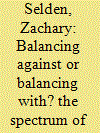

|
|
|
|
|
| Publication |
2013.
|
| Summary/Abstract |
During the 2001-2009 period when American foreign policy was internationally unpopular and perceived as unilateral, many states strengthened their security cooperation with the United States and facilitated the reach of the us military. This behavior spans a range of actions along a spectrum from reaffirming traditional alliances to far more subtle forms of alignment. This pattern is in large part driven by the actions of regional powers such as Russia and China whose rising power pushes neighboring states to seek the assurance of the United States, and it has distinct implications for the endurance of American hegemony. As those regional powers seek to expand their influence, secondary states may increase their contributions to the maintenance of American hegemony, thus helping to extend it well into the future. They are less prone to do so, however, if the United States follows a strategy of restraint that calls into question its willingness to defend its hegemony. Therefore, a policy focused on maintaining American military preeminence and the demonstrated willingness to use it may be what sustains the cooperation from second-tier states that helps to maintain American hegemony.
|
|
|
|
|
|
|
|
|
|
|
|
|
|
|
|
| 2 |
ID:
086980
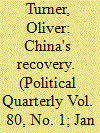

|
|
|
|
|
| Publication |
2009.
|
| Summary/Abstract |
China has been a major power for far longer than is typically acknowledged in the West. This paper seeks to redress established discourse of China as a 'rising' power which now enjoys common usage within Western policy-making, academic and popular circles, particularly within the United States; China can more accurately be conceived of as a 'recovering power'. A tendency by successive Washington administrations to view the world in realist terms has forced the label of 'rising' power onto China along with the negative connotations that inevitably follow. We should acknowledge the folly in utilising a theoretical approach largely devoid of any appreciation for the social and human dimensions of international relations as well as the importance of social discourse in the field. Finally, policy-makers in Washington must reconsider their realist stance and, with a fuller appreciation of world history, recognise that American hegemony was always destined to be short-lived.
|
|
|
|
|
|
|
|
|
|
|
|
|
|
|
|
| 3 |
ID:
165982
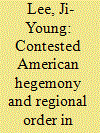

|
|
|
|
|
| Summary/Abstract |
Why did American-led postwar institution building lead to different types of security orders in Asia and Europe? The article investigates the failure of the Southeast Asia Treaty Organization (SEATO)—the only postwar multilateral security organization in the Asia-Pacific region that resembled NATO—as contrasted with NATO’s survival. Despite the popular notion of ‘American liberal hegemony’, the US-led multilateral security institution in fact faced serious resistance in Southeast Asia during the early years of the Cold War, as regional players viewed SEATO as yet another form of Western imperialism threatening their independence. The article makes a theoretical argument for the role of delegitimation in hegemonic order formation and shows that the Asian historical experience of Western colonialism had structural consequences for American-led hegemonic order building in Asia. China-India joint delegitimation strategies against the United States invoked local actors’ collective beliefs against colonialism portraying SEATO as a vehicle of Western domination. Once established, the United States’ European allies within SEATO placed constraints on the exercise of American hegemonic power, by taking advantage of the multilateral rules of SEATO and refusing to act collectively in the local crises in Laos. Archival evidence suggests that such delegitimation and restraint strategies were fairly successful in terms of limiting SEATO membership and blocking interventions in Indochina, strengthening Asian neutrality rather than creating a pro-US bloc in the region.
|
|
|
|
|
|
|
|
|
|
|
|
|
|
|
|
| 4 |
ID:
105356
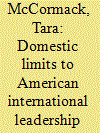

|
|
|
|
|
| Publication |
2011.
|
| Summary/Abstract |
In this article it is argued that there is a striking absence from contemporary academic (and policy) discussions about American international leadership, and that is the domestic dimension to international leadership. Most current discussion focuses upon the actions of the Bush administration in the international sphere, which is argued to have eroded legitimate American leadership. It is hoped that Obama can reinvigorate American leadership through his actions in the international sphere. Here, however, it is argued that legitimate American leadership during the Cold War was based firstly upon a specific domestic political context in Europe. This specific domestic political context has steadily changed since the late 1960s, eroding legitimate American international leadership. In the absence of this domestic context, America will not be able to reassert legitimate leadership. International legitimacy, like charity, must begin at home in the domestic political sphere.
|
|
|
|
|
|
|
|
|
|
|
|
|
|
|
|
| 5 |
ID:
160481


|
|
|
|
|
| Summary/Abstract |
How does maintaining international primacy affect a hegemon's domestic political economy? Debates on hierarchy, retrenchment, and structural power in the global economy are dominating international relations, yet scholars pay limited attention to the second-image reversed consequences of America's global role. The three books under review begin to correct this deficit. Combining their insights uncovers the effects of power politics on an area of substantial public and academic interest: economic inequality. While rising inequality is surely a multicausal outcome, research across the social sciences pinpoints technological change and the financialization of the American economy as fundamental drivers of the recent “redistribution.” These two shifts are generally treated as exogenous shocks in our models; the causal logics of the works under review illustrate that hegemony is the underlying, endogenous force. The analysis indicates a need for political scientists to study the interaction of international and domestic politics as a dynamic process, which would be bolstered by borrowing historical institutionalism's analytic toolkit. Investigating feedback loops and sequencing across both levels of analysis and across issue areas that are currently studied in isolation indicates an agenda that will better integrate security and political economy scholarship.
|
|
|
|
|
|
|
|
|
|
|
|
|
|
|
|
| 6 |
ID:
141302
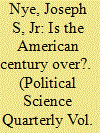

|
|
|
|
|
| Summary/Abstract |
Discusses whether the “American century” beginning in 1941 has come to the end. He argues that transnational and non-state forces are changing America’s pre-eminence, but that we are not entering a post-American world.
|
|
|
|
|
|
|
|
|
|
|
|
|
|
|
|
| 7 |
ID:
110133
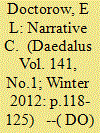

|
|
|
| 8 |
ID:
139000
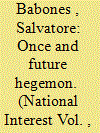

|
|
|
|
|
| Summary/Abstract |
IS RETREAT from global hegemony in America’s national interest? No idea has percolated more widely over the past decade—and none is more bogus. The United States is not headed for the skids and there is no reason it should be. The truth is that America can and should seek to remain the world’s top dog.
|
|
|
|
|
|
|
|
|
|
|
|
|
|
|
|
| 9 |
ID:
189836
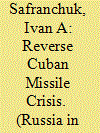

|
|
|
|
|
| Summary/Abstract |
This article conceptualizes the current crises around Ukraine and Taiwan
as “a reverse Cuban missile crisis.” The Cuban missile crisis was a turning
point in the history of the Cold War. The two superpowers found themselves
at the brink of mutual annihilation and turned to negotiations to prevent
it. Today the transformation of the world order and escalation of the great
power competition can culminate in a new crisis like the Cuban one, and
with a similar outcome. However, in contrast to the USSR which ultimately
recognized the United States’ red lines, today the U.S. does not recognize
Russia’s and China’s red lines, denying the very legitimacy of red lines as
such. The U.S. plans to retain its hegemony and seeks to achieve it with the
help of its regional allies. This strategy of “offshore balancing” has proven
to be quite useful for the U.S., which seems to ignore any discontent coming
from Russia and China.
|
|
|
|
|
|
|
|
|
|
|
|
|
|
|
|
| 10 |
ID:
110245
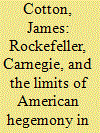

|
|
|
|
|
| Publication |
2012.
|
| Summary/Abstract |
This essay contributes to the emerging debate on the origins of international studies, focusing on evidence regarding Australia. While neither Carnegie nor Rockefeller had a primary interest in international studies, the largest US foundations had a major impact on the emergence of the subject in Australia ca. 1920-60. This impact was direct, through the provision of funding to individuals (via fellowships) as well as to organizations; it was also indirect by virtue of the support given to the Institute of Pacific Relations (a proportion of which was actually for specific Australian purposes). How this impact is to be characterized turns in part on methodological questions; it cannot however be seen as a clear case of the imposition of Gramscian-style hegemony in the realm of ideas. The most apparent influence of the foundations was to direct the attention of a selected body of Australian intellectuals, of sometimes diverse views, beyond Empire to transnational concerns.
|
|
|
|
|
|
|
|
|
|
|
|
|
|
|
|
| 11 |
ID:
106841
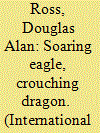

|
|
|
| 12 |
ID:
177072
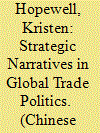

|
|
|
|
|
| Summary/Abstract |
The characterization of the United States as a liberal hegemon seeking to uphold free-market capitalism against the illiberal state capitalism of China and other emerging powers has become commonplace, along with the attendant notion that American economic openness has been exploited by the unfair trade practices of other states. Given their dominance in US political discourse and role in shaping contemporary policy—including fuelling Trump’s trade wars and aggressive unilateral trade actions against all of the United States’ major trading partners, his attacks on the World Trade Organization, and talk of a “new Cold War” between the United States and China—these claims merit far greater scrutiny. In this article, I challenge the stark dichotomy frequently drawn between American “free-market capitalism” and the “state capitalism” of its emerging challengers, arguing that this forms part of a strategic narrative deployed for political purposes, including legitimating the United States’ use of aggressive trade policy measures. An examination of the American hegemon’s actual trade and industrial policies complicates this characterization. Despite presenting itself as a promoter and defender of free trade, I show that the unifying logic of US trade policy has always been the promotion of American economic interests: the United States has engaged in considerable state intervention and trade protectionism, both to shield vulnerable industries and support others to achieve and maintain their global dominance.
|
|
|
|
|
|
|
|
|
|
|
|
|
|
|
|
| 13 |
ID:
100528
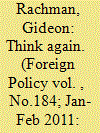

|
|
|
| 14 |
ID:
129720
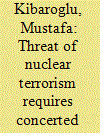

|
|
|
|
|
| Publication |
2014.
|
| Summary/Abstract |
The threat of nuclear terrorism should not be underestimated because it can have catastrophic effects if and when realised. Nor should the subject matter be politicised beyond a certain point because of its strong espousal by the United States, which has raised suspicions about whether the issue could be used as yet another instrument for asserting American hegemony. Institutionalisation of multilateral actions must therefore be supported and nuclear summit meetings must become the forums for addressing the doubts and concerns relating to the international initiatives.
|
|
|
|
|
|
|
|
|
|
|
|
|
|
|
|
| 15 |
ID:
168924
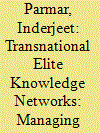

|
|
|
|
|
| Summary/Abstract |
The liberal international order’s own theory is as much in crisis as the institutional system whose virtues it champions. This is due first to theoretical shortcomings per se, and due second to its misunderstanding or neglect of the role of elite knowledge networks and of socialization in the development and perpetuation of American liberal hegemony. This article, which adds to recent interest in the dynamics of hegemonic-order building and maintenance, argues that a neo–Gramscian-Kautskyian theoretical synthesis better explains the character and methods of the liberal international order. The article considers two cases through which to compare liberal-internationalist and Gramscian-Kautskyian claims: the 1970s challenge of third-world states under the banner of a new international economic order (NIEO) and the managed opening of China, and the Trumpian challenge to the liberal international order. On that basis, the article concludes that the hegemonic liberal international order and its core states and elite networks are engaged in a titanic struggle against forces unleashed by a combination of its own successes, inadequacies, and exclusions. Gramscian-Kautskyian theory, using the transnationally extended “elite knowledge network” concept, also suggests that, despite turbulence, the hegemonic liberal international order has significant powers of adaptation, co-optation, and resistance, and is likely to remain resilient, if turbulent and not unchanged, for the foreseeable future.
|
|
|
|
|
|
|
|
|
|
|
|
|
|
|
|
|
|
|
|
|